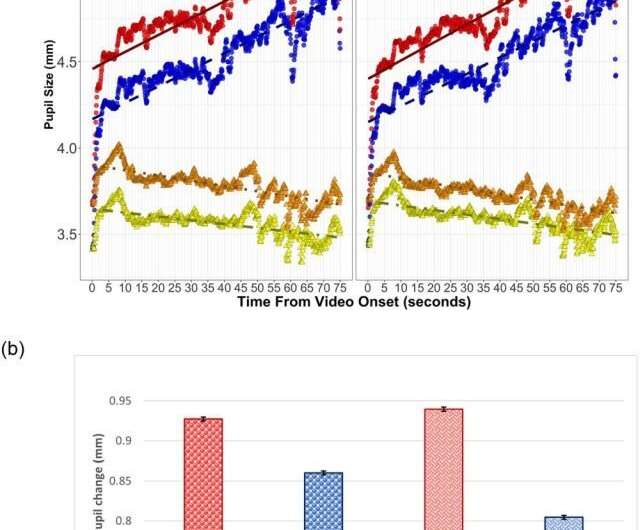September 16, 2021 report
Supportive married couples found to experience less stress when watching horror movies

A team of researchers from Brigham Young University and Arizona University, has found that married couples who support each other when watching horror movies experience less stress than couples who are not as supportive. The team has written a paper describing their experiments and what they learned from them and have uploaded it to the open-access site PLOS ONE.
Prior research has suggested that people experience less stress during stressful times if they have support from another person. However, as the researchers with this new effort note, such experiences are difficult to measure. In this new effort, they set up a simple experiment that they believed could be used as a way to measure such events.
For their study, the researchers asked 83 couples who had been married for at least 10 years to watch short video clips captured from the stressful parts of horror movies. In the experiments, the researchers asked one of the volunteers in a couple to sit and watch a stressful video clip while their spouse sat next to them listening to unrelated music. Afterward, the couple would switch places. Also, in some scenarios, the couples were asked to hold hands and to behave in a supportive manner, while in other scenarios they were asked to sit slightly apart. As the experiments were unfolding, the researchers measured stress responses in the volunteers using blood pressure cuffs and pupil eye dilation measuring software. Each volunteer was also asked afterward how they felt regarding their spouse as they watched the video clip.
The researchers found that approximately two-thirds of the couples who held hands during the video clips had a lower stress response. Most of them also reported feeling more supported as they watched the videos.
The researchers suggest their findings hint at the impact that spousal support can have on people in a relationship, particularly during times of stress. They acknowledge that their results are difficult to apply under different circumstances, but they still recommend that couples actively look for ways to be supportive of one another as a way to not only make their relationship better but to improve their physical health as well.
More information: Tyler C. Graff et al, Spousal emotional support and relationship quality buffers pupillary response to horror movies, PLOS ONE (2021). DOI: 10.1371/journal.pone.0256823
© 2021 Science X Network


















